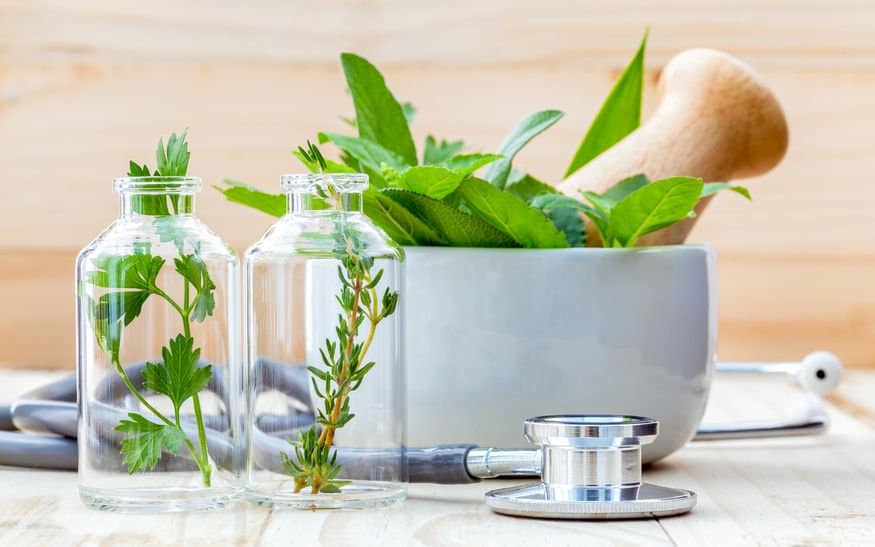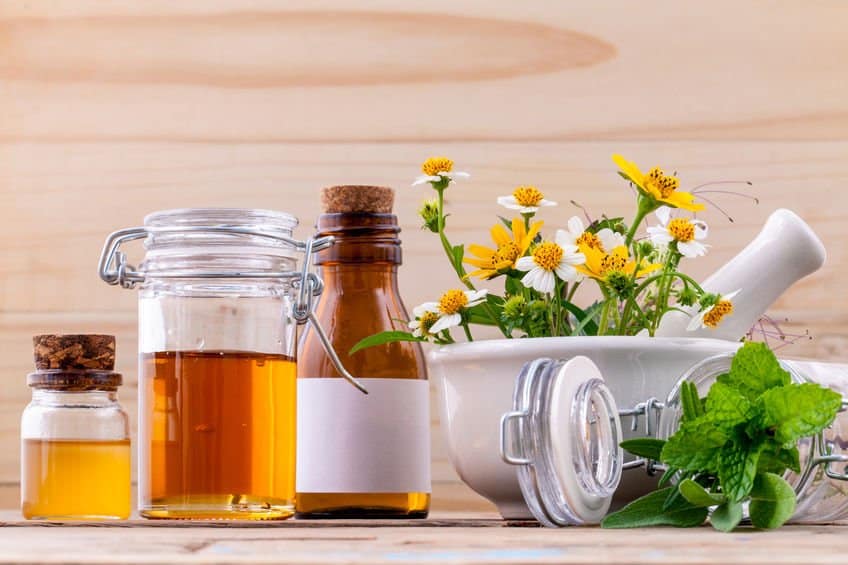
If you’re here because you suspect you have a UTI, I am so sorry; I know how much it hurts. Just mentioning a urinary tract infection is enough to make those (unfortunately) in the know wince. Too many men and women have experienced the burning pain, constant trips to the bathroom, and frequent recurrence of these infections.
As a frequent sufferer of UTIs in years past, I became fearful of any unusual twinges or discomfort from my abdomen and below. I learned to recognize them as signs of another painful infection taking hold.
Many doctor’s appointments and prescriptions later, I discovered a solution that worked to stop my recurrent infections. Thankfully, by following an all-natural preventative regime, and using home remedies to treat symptoms as soon as they appear, my UTIs have almost entirely disappeared.
There are many essential oils and natural remedies that can ease your symptoms and keep UTIs at bay. I discovered what works for me, so can you. But first things first.
What Is A Urinary Tract Infection?

Your urinary tract is a complex system, designed to extract and eliminate liquid waste from your body. This system is comprised of several parts:
- Two kidneys located toward the lower back are responsible for removing waste from the blood in the form of urea, water, and other minute particles that together form urine.
- Two ureters are the narrow tubes responsible for transporting urine from your kidneys to your bladder.
- Your bladder is an empty organ that expands to store urine as it is produced. When nerves in the bladder signal that it is full, it contracts to eliminate urine through the urethra. Until that signal, two sphincter muscles prevent urine leakage by tightly closing the opening of the bladder.
- The urethra is the last part of the urinary system. It is the tube through which urine passes out of the body.
Under normal conditions, this system works harmoniously together. When an infection occurs in your urinary tract, it doesn’t operate as it should.
A urinary tract infection occurs when harmful bacteria overrun one part or a few parts or your entire urinary system. UTIs are caused by a variety of bacteria, but two bacterial strains are the most common culprits. E. coli is responsible for more than 85% of all UTIs and Staphylococcus Saprophyticus causes anywhere from 5-15% of the remaining infections.
When any of these harmful foreign bacteria are introduced to your urinary tract you’ll know it; it won’t take your body long to respond.
Common UTI Symptoms
You may already be all too familiar with the signs and symptoms of urinary tract infections, but if you are experiencing any of the following symptoms for the first time, you may have a UTI.
Common Symptoms of UTIs include:
- Frequent, intense urges to visit the restroom, although little urine comes out
- Pain or burning upon urination
- Cramping, discomfort, or pressure in lower back or abdomen
- Urine that appears cloudy, dark, contains streaks of blood, or has a foul or strange smell
- Unexplained fatigue
Signs a UTI Has Spread to Your Kidneys include:
- Increase in lower abdominal and back pain or pressure
- Fever or chills
How UTIs Happen?
The most common culprits of UTI, E. coli and Staphylococcus, enter your urinary system through your stomach, literally by the process of elimination.
Because we don’t always eat perfectly prepared or pristine foods, there are countless bacteria in your gut, most of them harmless to you as long as they remain where they are. As your body eliminates solid waste, some of these bacteria also exit the body. Even if you clean up thoroughly afterward, many microscopic bacteria will remain on your body.
These bacteria migrate rapidly in a short amount of time, moving closer to your ureter. This migration gives them easy access to your urinary tract. In certain situations, these bacteria become introduced to this sensitive system, starting the painful cycle of a UTI.
Risk Factors That Make You Susceptible To UTI
While the bacterial strains that cause UTI are common to everyone, infection only occurs in certain individuals. There are specific risk factors that indicate a higher likelihood of possible urinary tract infection.
UTI Risk Factors For Women (RFW)
Most UTIs are diagnosed in young to middle-aged women. According to recent research statistics, as many as 60% of all women will experience a urinary tract infection over the course of their lifetime. Several factors suggest a woman may be at risk of developing a UTI, continue reading to see if any of them apply to you.
RFW 1 – Sexual activity
Intercourse causes UTIs in women so frequently that it is sometimes called the “honeymoon disease.” The reason sex causes infection is that it forcefully pushes any bacteria present in the surrounding tissue into the urethra. If you use a diaphragm or spermicidal birth control your risk is further increased.
RFW2 – Wiping back to front
When you go to the toilet, wiping back to front afterward introduces harmful bacteria to your urinary system.
RFW3 – Pregnancy
Pregnant women suffer from UTIs because pressure from the expanding uterus on their bladder may prevent them from completely emptying their bladder when using the restroom. If any bacteria are present in the urine that remains, an infection can develop.
RFW4 – Previous UTIs
If you have had previous or recurrent urinary tract infections, it’s an indicator that you may be susceptible to them in the future.
RFW5 – Menopause or low estrogen
Estrogen offers natural protection to women against UTIs. When levels of this hormone decrease, or are insufficient, the bacteria that cause infection in the urinary tract can grow and spread.
UTI Risk Factors For Men (RFM)
While men are less likely to develop a UTI, some factors indicate you may be susceptible to having one. You may be among the many men at risk of experiencing the burning pain of a urinary tract infection if any of the following factors apply to you.
RFM1 – Prostate gland complications
An enlarged prostate can cause blockage issues in the bladder. When the prostate gland blocks the flow of urine, the bladder cannot empty completely, giving bacteria time to grow.
RFM2 – An uncircumcised penis
Men with an uncircumcised penis are ten times more likely to experience a UTI than their circumcised counterparts. The foreskin, if not kept clean, becomes a breeding ground for bacteria that are then easily transferred to the urethra.
RFM3 – Anal intercourse
Engaging in anal intercourse puts your urethra in direct contact with the most common UTI causing bacterial strains.
RFM4 – Unprotected sex
In the same way that a woman’s urethra meets migrating bacteria through intercourse, a male urethra can also become infected with the same bacteria without protection.
RFM 5 – HIV positive
An immunocompromised person is at higher risk of developing any number of infections, including UTIs.
Risk Factors That Affect Everyone
Men and women with these risk factors should be on the lookout for tell-tale signs of a UTI.
Catheterization
Bacteria can enter the ureter and bladder when a catheter is placed, increasing the possibility of developing an infection.
Kidney Stones
If you develop or have a history of developing kidney stones, they may block urine flow from the bladder and give bacteria an opportunity to thrive.
Diabetes
Because diabetes is a chronic condition, one side effect is a weakened immune system. This weakness puts diabetic men and women at higher risk of developing a UTI.
Genetic Anomalies
A structural irregularity anywhere along the urinary system is a risk factor for developing a UTI. Some people affected are born with this type of structural concern, but they can develop at any stage in life.
Treating A UTI

The current trend in UTI treatment is through traditional and natural medicine. While this is a viable course of action, it is not the only way to treat or prevent future urinary tract infections. There is more than one useful option for those seeking a cure for their current or recurrent UTI; it’s important that you do your research and make the decision that is best for you.
1. Antibiotics
Modern medicine is a good thing, and there are times antibiotics are medically necessary. There are a wide variety of antibiotics prescribed to treat urinary tract infections, from broad-spectrum to strain specific. A visit to your primary care doctor can confirm whether you have a UTI, and a bacterial culture can determine what strain you have contracted.
It may take one or two days for the results of your urine culture to reach your doctor’s office. In the meantime, you will likely be sent home with a starter prescription for an antibiotic that treats the most common bacterial causes of UTI, and a prescription for UTI-specific pain medication.
If you are suffering from recurrent UTIs, your physician may suggest a long-term antibiotic plan as a more aggressive and proactive approach. Taking antibiotics is not a cure-all, however. There are pros and cons to choosing this method of treatment.
Pros
- The right antibiotic specific to the bacteria causing your UTI has a 94% cure rate in uncomplicated cases
- Antibiotics are fast acting, meaning you may experience rapid relief of symptoms
- Commonly prescribed UTI analgesic medication is highly effective at symptom alleviation while antibiotics take effect
- A standing antibiotic regime can prevent future UTIs from developing in recurrent cases
Cons
- With continued antibiotic treatment, many UTI bacterial strains are becoming resistant to the drugs, making it harder to cure infections with traditional medicine
- Antibiotic use, especially extended use, kills the good bacteria along with the good and disrupts the pH balance of your body. Many women contract yeast infection immediately after antibiotic treatment for UTI because of this; related digestive issues are also becoming more common.
2. Natural Remedies
If you are experiencing the onset of UTI symptoms, are looking for a way to alleviate the pain of a current infection, or are trying to prevent future infections, natural remedies may be the right choice for you.
Essential Oils
While not widely promoted in modern medicine, essential oils are very effective combatants against bacterial infection. Some have even been proven more effective than traditional antibiotics in clinical settings.
Other Home Treatment Options
The moderate to extreme discomfort caused by UTIs can be relieved by many home remedies, and there are quite a few natural tips and tricks that can prevent future infections from occurring. If you catch a UTI in the first stages, often home remedies are enough to stop a urinary tract infection in its tracks.
Renewed interest in the science of natural healing has increased substantially in recent years, and many remedies are highly effective. However, you should not decide on a course of treatment for your UTI without consulting your primary care doctor. Also, before you start a natural treatment or prevention plan, weight the pros and cons carefully, and make the decision that it best for your situation.
Pros
- Essential oils are an all-natural, biologically symbiotic way to treat an infection. They work with your body’s natural healing ability rather than overriding it or working against it.
- Many natural remedies are just as effective or superior in effectiveness compared to traditional antibiotics.
- As more bacterial strains become antibiotic resistant, essential oils and probiotics offer an alternative solution to common infections
Cons
- In the case of a more advanced, or complicated UTI antibiotics may be necessary to control the infection and prevent its spread
Best Essential Oils For UTI Relief And Prevention
Essential oils are a gentle and effective way to treat the symptoms of a UTI and potentially help to rid your body of the infection. Once you have healed completely, essential oils can help prevent the development of future infections as well.
If you decide to take any essential oil internally, it is best to understand possible allergic reactions and risks associated with each one. Make sure to discuss your decision with your doctor before doing so. The best essential oils for UTI treatment are listed below.
Six Best Essential Oils for UTIs
1. Frankincense
Frankincense is the resident healer in the essential oil community. It has high levels of compounds known to promote the body’s ability to heal itself and gives your immune system some extra kick.
This oil keeps your urinary tract clean and gives your body the strength it needs to fight off invading bacteria when used preventatively.
2. Oregano
One recent clinical study on oregano oil showcased the oil’s ability to halt the growth of E. coli bacteria. The results were so promising that many researchers suggest oregano oil as a promising alternative to antibiotics in treating UTIs because of its higher potential in both effectiveness and quick healing.
Further, oregano oil has one distinct edge over antibiotics because it doesn’t increase resistance to antibiotics in bacteria. Be aware that oregano oil must be diluted before use to prevent skin sensitivity as it is highly potent.
3. Lemongrass
While lemongrass oil is commonly used to promote spiritual and mental healing, it is also a strong support to immune health. Taken during treatment for a UTI, this oil will speed healing along, and can also strengthen the body’s ability to fight new infections.
4. Clove
Clove oil is antimicrobial, antifungal, and antiviral. It also has pain relieving and immune boosting properties. Clove oil is safe to use internally but do so only under the supervision of your health care advisor. It is the perfect oil to use in conjunction with antibiotics for your UTI to prevent yeast infections, promote quick healing, and reduce inflammation caused by the infection.
5. Juniper Berry
Juniper berry oil is the go-to choice for kidney and urinary system support. It has detoxifying properties that, if taken quickly at the first appearance of UTI symptoms, can prevent the infection from growing worse. Juniper berry oil also flushes bacteria from your urinary system if consumed. Again, talk to your doctor prior to using this oil.
This oil can also be used topically to cleanse your delicate areas and prevent bacterial migration. Remember to dilute in a carrier oil before topical application.
6. Tea Tree
The vapors of tea tree oil have proven effective at inhibiting the growth of E. coli bacteria. The one downside is that tea tree oil, also known as melaleuca oil, is not recommended for consumption and therefore cannot work its magic from the inside of your body.
Tea tree essential oil is fantastic as a preventative measure, though. Adding some to your bath water will clear unwanted bacteria from your delicate areas, and keep UTIs at bay.
3 Essential Oil Recipes That Help Treat UTIs

Essential oils can be combined with others for an effectiveness boost. Here are 3 recipes that worked for me. Make sure you only purchase edible therapeutic grade essential oils that can be taken internally for use against UTIs and consult with your doctor beforehand.
Further, you are welcome to post your questions in the comments section underneath the post.
1. Infection Inhibitor
If you are feeling the first twinge of UTI pain, try this right away. It can stop the infection from developing if taken in time.
Ingredients:
- 1 drop clove oil
- 1 drop cinnamon bark oil
- 1 drop lemongrass oil
- 1 drop rosemary oil
- 2 drops oregano oil
- 2 drops frankincense
Combine all essential oils thoroughly in a small glass bowl and dilute in 2 tsp of carrier oil such as coconut oil. Using a clean dropper, fill gel capsules with the blend. Take one capsule twice per day.
2. UTI Healing Hydration
When fighting off a urinary tract infection drinking plenty of water is essential. Add a few drops of essential oil for added punch.
Ingredients:
- 5-10 drops lemongrass or juniper berry essential oil
- 8 oz. distilled water
Stir oil into each glass of water. Drink at least six glasses of water each day to flush the infection from your system and prevent them from recurring in the future.
3. Detoxifying UTI Topical Ointment
This roll-on ointment is ideal when trying to maintain proper balance in your private area and promotes healthy urinary system function.
Ingredients:
- 10 drops juniper berry oil
- 10 drops rosemary oil
- 10 drops lemongrass oil
- Coconut oil as carrier oil
Thoroughly mix all essential oils in a 10-ml size roller bottle. Once combined add coconut oil and close lid. Shake to distribute oil evenly with coconut oil. Apply twice daily for best results.
Best Home Remedies For Urinary Tract Infections
There is an abundance of home remedies that are highly effective in treating a UTI in the first stages and preventing recurrence. Some of the best choices are listed here, see if one of them does the trick for you.
1. D-Mannose
This simple sugar is so similar in structure to glucose that it tricks E. coli into eating it instead. This activity prevents the bacteria from sticking to the walls of your urinary tract and keeps infection at bay.
D-mannose comes in many forms: capsule, powder, and diluted liquids. Take it any way you can get it; it is a UTI-fighting powerhouse.
2. Probiotics
Bacterial resistance to antibiotics has made probiotic use in UTI treatment a necessary option. Probiotics support a healthy immune system and promote the body’s ability to heal itself, without increasing antibiotic resistance in bacterial infection.
As an added benefit, probiotics stimulate the growth and health of normal body flora, supporting your overall health and well-being.
3. Herbal Remedies
Uva Ursi (bearberry leaf) and Goldenseal are both effective herbal remedies for UTIs. They have both been known to cure lower urinary infections, but use with caution. Be especially careful to use uva ursi for five days or less, because it can cause liver damage. Fill your medical advisor in before starting an herbal remedy treatment plan.
Some Additional Tips To Prevent UTIs
Hydration with a Kick
Drink up! There is no better way to prevent a buildup of harmful bacteria in your urinary system than staying hydrated. Drink the recommended six 8 ounce glasses of water every day.
As an added preventative measure, include an immune booster to your hydration regimen. I use one specifically for urinary health daily, called Uri-Active; but other immune boosters may work as well for you.
Cotton Underwear
Wearing breathable cotton underwear does more than keep you comfortable and dry. It prevents the rapid migration and growth of bacterial colonies near your urethra.
Showering Before Sex
Good hygiene is often enough to prevent a UTI infection. Shower before intercourse, and ask your partner to join you. Consider it foreplay!
Use the Restroom Often
Don’t wait if you feel the urge to go! Holding your urine may prevent your bladder from completely emptying when you do go, and gives any bacteria present in your urinary tract extra time to develop into an infection. Use the restroom frequently and keep your system clean.
A Word Of Caution
As mentioned before, you should consult your doctor or nutritionist before beginning any treatment regimen for a UTI. If your infection does not improve or gets worse during treatment seek medical attention immediately, as UTIs that reach the kidneys can cause a more severe infection in the blood.
If you are looking for remedies to help you end the cycle of UTI discomfort and frustration, consider essential oils as part of your healthy urinary system care. Including oils and other natural remedies in your regular urinary care can help you find some much-needed relief and prevent future infection.






